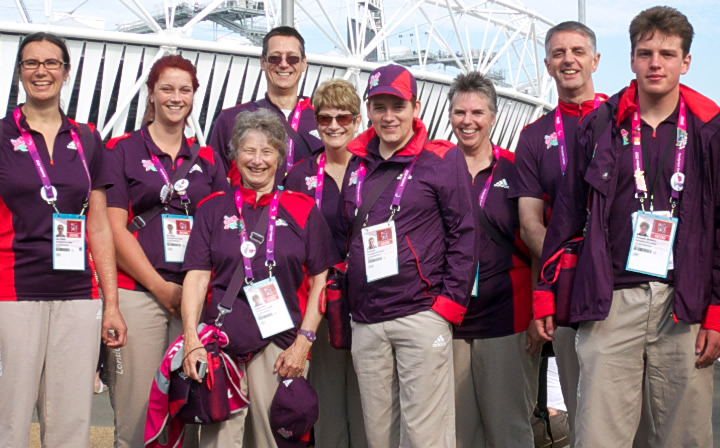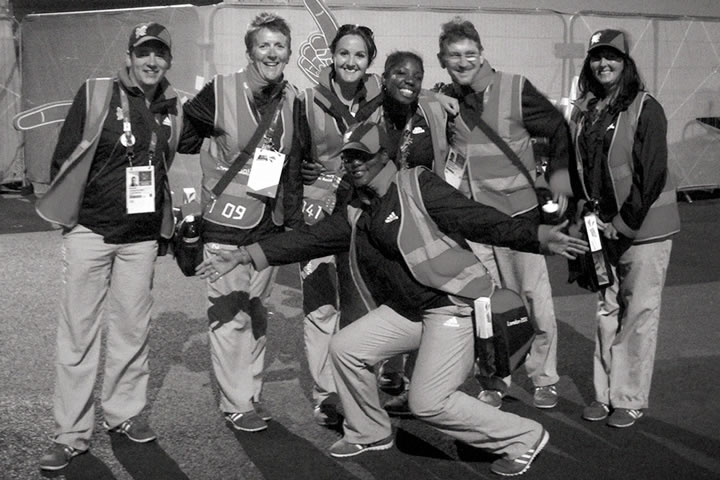
They say change is as good as a rest. With early morning commutes, a ‘distinctive’ uniform and interaction with the general public, volunteering at the London 2012 Paralympic Games couldn’t have been further removed from the desk-bound job I’d become weary of.
The Last Mile
When I applied to be a volunteer two years ago, I hoped to get selected to work at the Olympics: the more glamorous event with an incredible history. It didn’t work out that way, but volunteering at the Paralympics meant I could enjoy the spectacle of a home Olympics before embracing the Games Maker experience, where I would be working within a group called the Last Mile.
As training events later revealed, this meant working outside venues, welcoming people and pointing them in the right direction. Would being so far away from the action diminish both the enjoyment and importance of my role? A final training session only heightened my concerns. Not only did I discover that I’d be working in and around the Westfield Shopping Centre, but that my team would be based inside a car park!
Small Acts of Kindness
I arrived at my first shift wondering if it would be my last. The car park was dark and uncomfortable, but it was filled with friendly, excitable faces. While grey skies yielded heavy rain and my team leader’s grumpiness slowly morphed into nonchalance, I enjoyed chatting to new colleagues and helping my first ‘clients’.
As I grew into the role, I slowly became addicted to it. The rain abated, and never returned.
Shifts were long, but they were filled with moments of joy. Children’s faces would light up when I put my hand out to give them a high five. Stern looking adults could be easily cheered by a cheeky comment or two. Helping someone with mobility problems get from the railway station to the park entrance was a chance for conversation and an opportunity to observe people visiting the park for the first time. Encouraging crowds to sing along to ‘If you’re happy and you know it’ or shout “Oggy Oggy Oggy” was especially fun; Games Makers with megaphones wielded much power.
I found myself televised on numerous occasions, though only in places like Ukraine! When John Inverdale gave me a prized BBC Paralympics pin badge, my excitement was obscured by the ear-piercing white noise omitted from the megaphone I dropped. Embarrassing.
Park Life
Working on the last mile turned out to be the plum job. It was an important role, and certainly the most visible. We were the first and last faces people would see at the Paralympic Games; if we upset anyone, volunteers in the park would know about it. Our role was to set the mood, if nothing else.
Although based outside the ticket gates, accreditation meant I could still pass through them and enter the Olympic Park. For many, visiting was a one-off experience, but I became numb to its innovative venues and beautiful landscaping.
Games Makers were also given tickets to see some events. Winning a ballot to fill seats inside the Olympic Stadium meant I could see the live athletics I thought I’d miss out on. Paralympic competition was not only inspirational but entertaining. I think back to watching the Long Jump F11 event, and silver medalist Li Duan’s pre-jump routine inspired by Bucks Fizz. Such perks were welcome – compensation for an unpaid job – but they were enjoyed with a sense of guilt.
Surrounded by colleagues of all ages, professions and backgrounds, I was using long repressed social skills. Rotated around different operational areas, only by my final shift did I start to recognise faces and get to know a few people a little better. As the last few spectators rushed into the closing ceremony, we relieved our boredom with the aid of wheelchairs, running time trials and rolling down ramps. With little left for unpaid volunteers to do (only paid staff stayed long into the night), we were sent home one final time.
A two-year journey had come to an abrupt end, the nervy expectation of two weeks prior replaced with an uneasy emptiness. Before our first shift, we were told to enjoy ourselves as it would be over before we knew it. And so it was proven.

A photo from the final Games Maker shift.
A Genuine Act
Like many others, I’m now suffering a post-Games come down. After a happy and glorious summer, in which Britain’s underlying warm and cheerful nature was revealed to an unsuspecting world, all that remains is retrospection.
I suspect the shift in the nation’s attitude was a confluence of many factors: good weather, the success of our athletes and the surprising competency of London’s organising committee, with the Games Makers living up to their name.
This was the result of extensive training. A six-hour programme spread over three events was probably overkill, yet it made everyone feel part of a larger team. When Eddie Izzard introduced February’s orientation event at Wembley Arena, he reminded us that it was 64 years since the Olympics were last hosted in the UK. If we had to wait that long again, most of us wouldn’t be around to enjoy it. This was a once in a lifetime event – so don’t fuck it up!
We were asked to remember the acronym I DO ACT: be Inspirational, Distinctive, Open, Alert, Consistent and act as part of a Team. Of all these attributes, I believe it was the second, distinctiveness, that ensured Games Makers were taken to the nation’s heart.
I’m tempted to compare the atmosphere at London 2012 to that of product launches at Apple Stores. Featuring the same level of excitement and enthusiasm, I find these experiences jarring; a manufactured form of joy. Yet at London 2012, nothing was scripted – and in many cases that was obvious. I believe this genuineness, in all forms, resonated with a British public that can be sceptical and standoffish.
The ‘L’ Word
With thoughts of a legacy already slipping down the political agenda, any lasting change has to come from the collective action of individuals.
I’m now encouraged to do more volunteering, perhaps even taking a break each year to do so. I’m also keen to be involved with Glasgow 2014, and possibly Rio 2016. Wider lessons can be taken from this experience too. I’m determined to become a little more open and approachable; a recent flight was more enjoyable having started a conversation with my neighbouring passenger for example.
I’ve also seen what it can be like controlling large crowds, and how a single exchange can ruin an otherwise enjoyable day. I think back to a member of the public arguing with me as I asked him to keep to the road instead of using the mobility lane. Yet on encountering a steward at a separate event days later, I behaved in exactly the same way.
Lessons can be quickly forgotten. Legacies are hard won.
Don’t be sad it’s over. Be glad that it happened at all.
Having seen amazing Olympic and Paralympic sport and spent considerable amount of time in the Olympic Park, I’m glad I experienced this moment in British history to its fullest extent. Having been a Games Maker, I was part of what made it a success.
The day after the games concluded, volunteers were asked to wear their uniform one last time so people could thank us for our work. It was also the day of the athletes victory parade through London. In a spontaneous act, Games Makers joined in behind the floats, with any volunteers spotted in the crowds lining the streets encouraged to do likewise.
Behind the athletes I had watched and admired, here was I, also being cheered. The intensity of this moment is difficult to put into words. The appreciation of the British public was quite simply, overwhelming. It’s not often you get to walk down the streets of London, with thousands of people cheering and applauding you. Returning home the next day, I watched the Closing Ceremony. As I listened to the speeches by Seb Coe and Sir Philip Craven in which they thanked the Games Makers, I was brought close to tears.
I made the Games, and the Games made me.